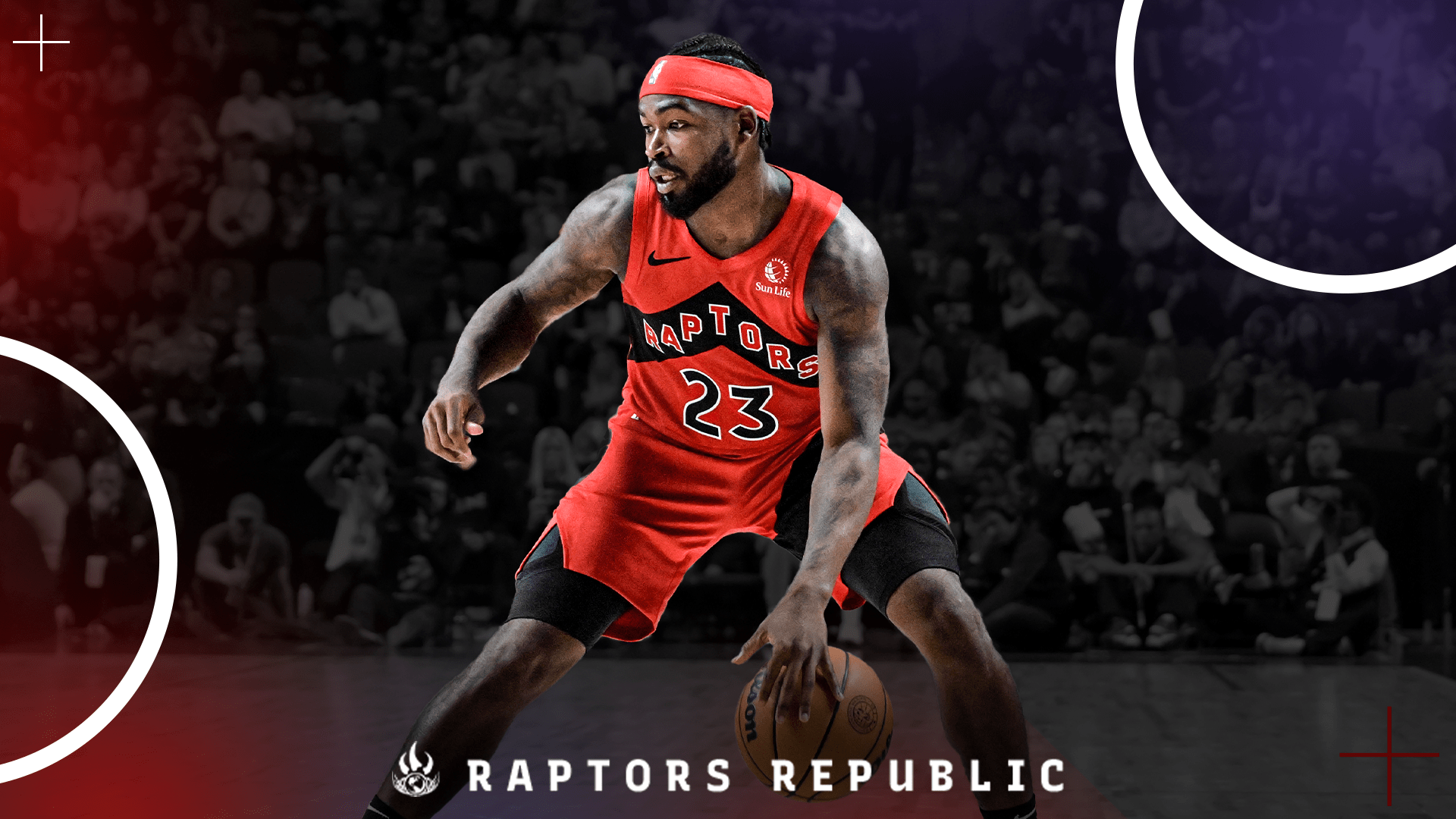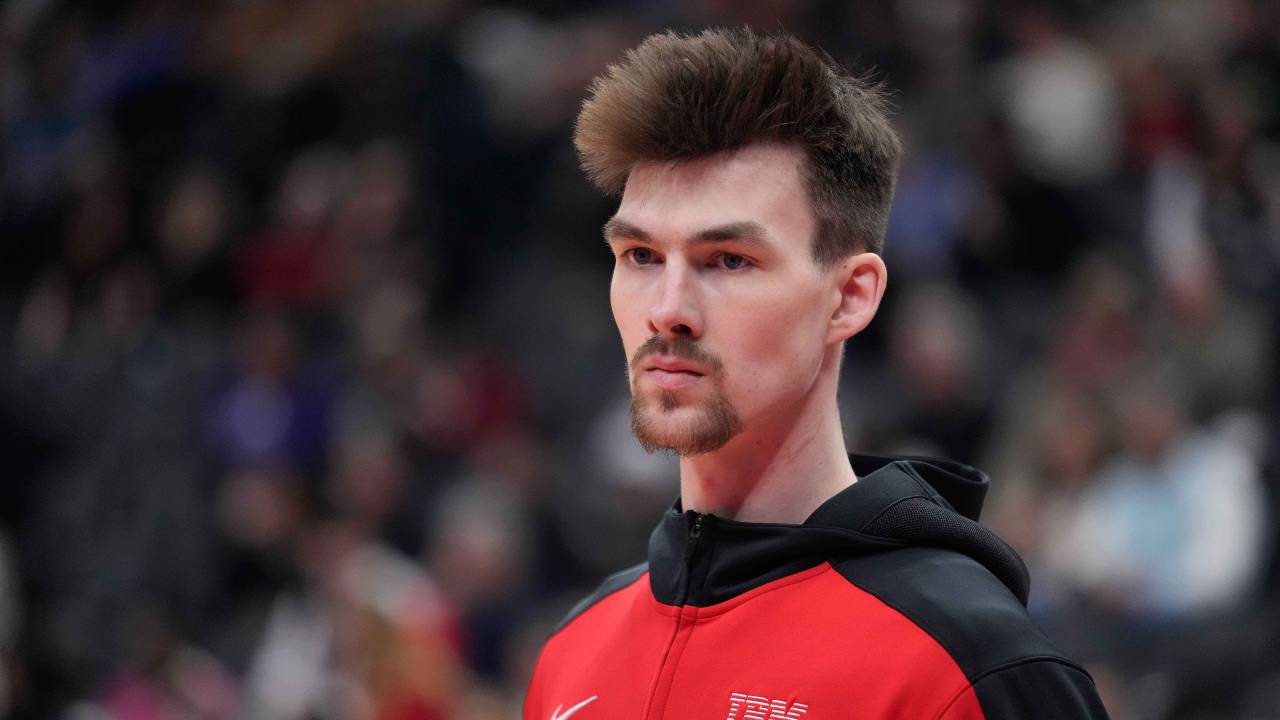The Raptors were extremely spoiled at the point guard position during the Kyle Lowry era. Not only did they have a player who could provide All-NBA impact year over year — even if he wasn’t selected repeatedly — but because of Lowry’s ability to flow on and off ball, the Raptors could invest big time minutes at the backup guard position because that player would not only lead bench units while Lowry was off, but could play alongside him and win minutes. After Fred VanVleet’s departure, the Raptors identified Immanuel Quickley as their point guard of the future. They’re also hoping that Jamal Shead can provide them dependability off the bench that’s been missing since VanVleet elevated out of that role.
Shead’s job is very simple in outline and extremely difficult in execution. He’ll be asked to set the tone as a ball pressure guard defensively. Providing high pickup points on every possession to badger opposing guards. On offense, it’s very hard for him to threaten as a cutter or spacer, so he’ll be asked to create repeatedly as the Raptors primary ball handler.
“I really don’t have any goals. I just want to be a part of winning.” Shead said.
Shead doesn’t usually view the game — or at least discuss it with media — through the lens of his own accomplishments, but rather through how he can support his teammates – which is a great characteristic for a point guard.
“I know that if I can get past my first defender that these guys will make my job easier by getting open.” Shead told me. “It’s a lot easier than college (being a lead guard), just because everyone here is a lot smarter.”
Getting past the first defender is Shead’s first and most important road block, and is most often helped out by a screen. When Shead faced coverages that saw his defender climbing over screens, he was in the 75th percentile in creating points out of the pick n’ roll. The first thing I noticed about his game at the NBA level was just how quick he was on ball, and he uses that quickness to transport himself into the lane to start playing the cat and mouse game of roller-tagger-corner man.
It typically works like this, and is one of the main advantage games of basketball: If your man goes over the screen and you drive with a roller, you create a 2-on-1 vs the big. To help out the big in the 2-on-1, the defender in the weak-side corner will tag the big to slow him/cover him while the on-ball guard catches up into the play. When that happens, their will be one player left to zone up the weakside and guard two shooters. It is up to the on ball guard to outfox the weak-side zone and find the open man. Doesn’t always work like this, and things can change based on coverage, but this is a staple of basketball in general.
“If anybody goes over on me, I’m good. That is the easiest thing ever. When people go over on me, and have to chase me off the ball screen, then I’m good. If I get someone coming up, and the roller is rolling and he gets behind the big, and his guy helps? It’s over with.” Shead said. “When people start going under and trying to make me shoot and trying to take away all my options, then that’s where it starts to get tricky.” The numbers bear that out, as Shead’s efficiency drops to the bottom third of the NBA when he faces a coverage that doesn’t have his primary defender going over the screen. Shead wasn’t so sure that teams would default to chase coverage as often going forward.
“The game will show you what you need to work on. I don’t know if they’ll guard me the same as last year, so once we get into the season the game will show me what I need to work on more.” Shead said. “I’m trying to get a more consistent three ball. A tighter handle. You know, getting a handle on the pace of the game. Try to be more in shape. If Quick’s in foul trouble, or if I’m actually playing well Darko can leave me out there.”
As far as navigating the under coverages if they do come? Re-screens, mastering angles? Shead has been preparing. “You try to simulate it in our workouts for sure. When I’m at home they’ll go under a lot and make me work on that.” But he also found hope in watching TJ McConnell’s Finals run.
“Watching TJ, man, he’s a dude that probably shot 5 threes in those Finals and was the 3rd or 4th most productive guy on their team. He gave a lot of guys like me hope, and a sense that we can play at the highest level and win at the highest level. I shoot more threes than him for sure — I can shoot a little better than him — but that aspect of ‘hey the three ball isn’t everything’ but the defense, and how you carry yourself, and how you create, and how you play hard – like he said: ‘playing hard is a skill’ and he’s mastered it. I think I’m on my way to mastering it.”
Obviously McConnell’s backcourt pressure — and backcourt steals — are something to aspire to, but if you want to emulate McConnell you need to be a short mid-range shot maker. Shead is no stranger to that, and even though he doesn’t use the jumper like McConnell does — truthfully no one functions like McConnell — he does have his floater, and uses it at a high volume.
In fact, Shead was nearly as likely to take a floater in the halfcourt as he was a layup (87 makes vs 109) and he shot them at virtually the exact same efficiency (44.8% vs 45%). Obviously it’s not ideal to have to rely on the floater so often, but it is a real skill Shead is bringing to the NBA table.
As for the defense, and the pressure, Shead is a believer in the NBA’s trend towards it and Coach Darko’s pitch on why the Raptors should partake: ”I think if you work really hard, and make it hard at the beginning of the shot clock and they finally get it down and get into their set, you maybe have to guard 12 or 13 seconds of real defense. So, I think Darko explaining that to us and pointing that out to us gave us that enthusiasm. If we go out and play super hard over 94 feet, once they get past halfcourt they’re tired. That aspect of the shorter shot clock so it’s a lot less defense, and you can go harder for a shorter period of time, and that’s easier.”
Of course, Shead has also talked often about how he’s been trying to acclimate to the NBA’s physicality, and how that physicality is called by the referees. He elaborated on it a bunch with me.
“I think just understanding after the first call (is made). I got to learn the referees, NBA referees are reoccurring, so it’s a bunch of the same people. You understand how they ref and build a relationship with them. You call them by their first name, because they are human beings, and once you build a relationship you understand how they ref. You know what you can ask them. You know what you can tell them, and you know how you can play.” Shead said. It’s a bit of a moving target, knowing how you’re going to be called, but Shead is trying to stay on top of it.
“I think towards the end of the season, I learned the refs a lot more and once I knew who was reffing our games I was like ‘cool I can be a lot more aggressive this game’ because James is reffing vs. Tony Brothers, because you can’t be very aggressive with him, but you can also get away with a lot of stuff because he’ll let you play a little bit – it’s just a mind game. I think the biggest thing that I learned is to watch Scottie first. How he goes out there, because he’s gonna be aggressive regardless – how they call him, because whatever he can get away with, I can get away with just a little bit less. So, just watching him and that first group.”
If the Raptors are going to threaten as a top-6 seed this upcoming season, they’re not only going to need steady play, and health, from their big name players, but they’re going to need to be flanked by an energetic, and professional 2nd unit. The Raptors will be able to turn to a few players on the roster when it comes to creation, but as far as backup point guards go, Shead is squarely in that spot. He’ll have a huge hand in making things hum. He’s confident in the team, though:
“I think we’re on track. I think the start of last year was the reason we were losing. A lot of guys were hurt. When we got to hit our stride, IQ broke his elbow, Jak’s hip was kind of messed up. A lot of guys who were really helpful for us — I mean our whole second unit was rookies — so a lot of guys who were helpful for us got hurt. Also trading for BI, I think we’re on track for something special here. It starts with our first group, but we’re not rookies anymore. I think we can really contribute and really help those guys.”
Shead is waiting to see what the game will show him, and I am too.
Have a blessed day.



